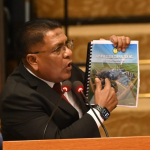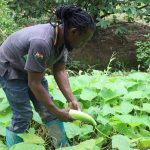The government is making strides in advancing the country’s coconut industry through its decentralisation programme and introduction of high-yielding and disease-resistant varieties.
The Dr Mohamed Irfaan Ali- led Administration rolled out the programme in 2022, which aligned with its manifesto commitments.
The massive undertaking saw the establishment of nine coconut nurseries in Charity, Kairuni, Wakenaam, Leguan, Canal No. 2, Corentyne, Hosororo, Fort Wellington, and Lethem.
Additionally, the government produced 45,000 coconut seedlings to promote expanded cultivation.
In 2023, a new high-yielding and disease-resistant coconut variety will be introduced to farmers with eight demonstration plots to be established in Regions Two, Three, Four, Five, and Six.
Agriculture Minister, Zulfikar Mustapha said with the international coconut industry anticipating tremendous growth by 2026, it was critical for Guyana to ensure it was in a place to tap into that market.
Internationally, the coconut industry is expected to be a US$30 billion industry by 2026, therefore Guyana needs to set the stage to tap into this market.
“We will be working to develop industries utilising four popular by-products of coconut which include the husk, shell, meat, and water,” Minister Mustapha said.
The government has already collaborated with the Caribbean Agriculture Research and Development Institute (CARDI) and introduced the Brazilian Green Dwarf coconut variety, known for its high-yielding properties and tolerance to common pests and diseases.
The ministry plans to decentralise coconut facilities countrywide to provide farmers with the necessary support to expand the industry.
A coconut nursery was constructed and stocked for $4.3 million in Hosororo Village and a $1.1 million coconut nursery was commissioned at Kairuni on the Soesdyke-Linden Highway.
The coconut industry is the third most lucrative locally.






